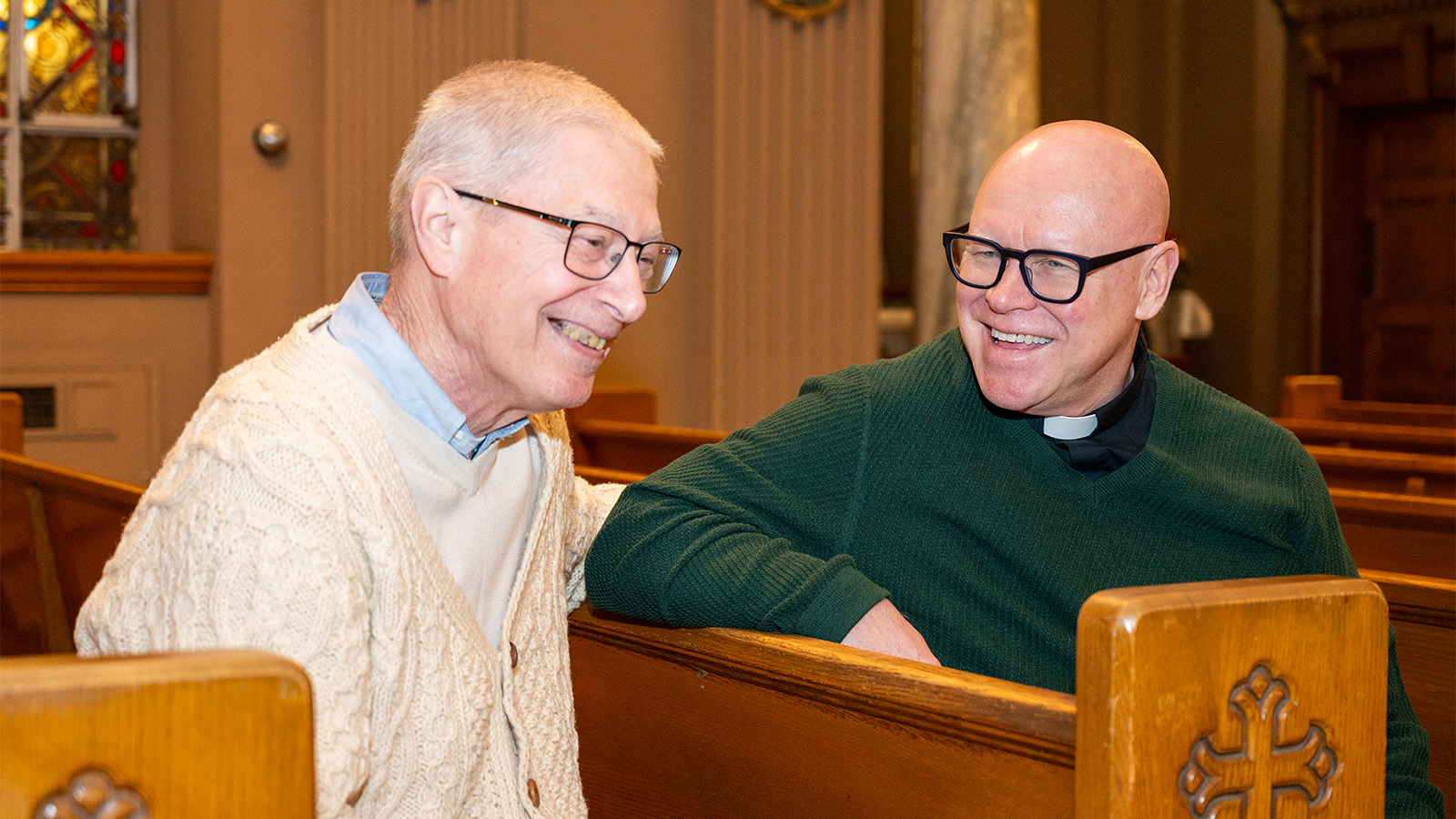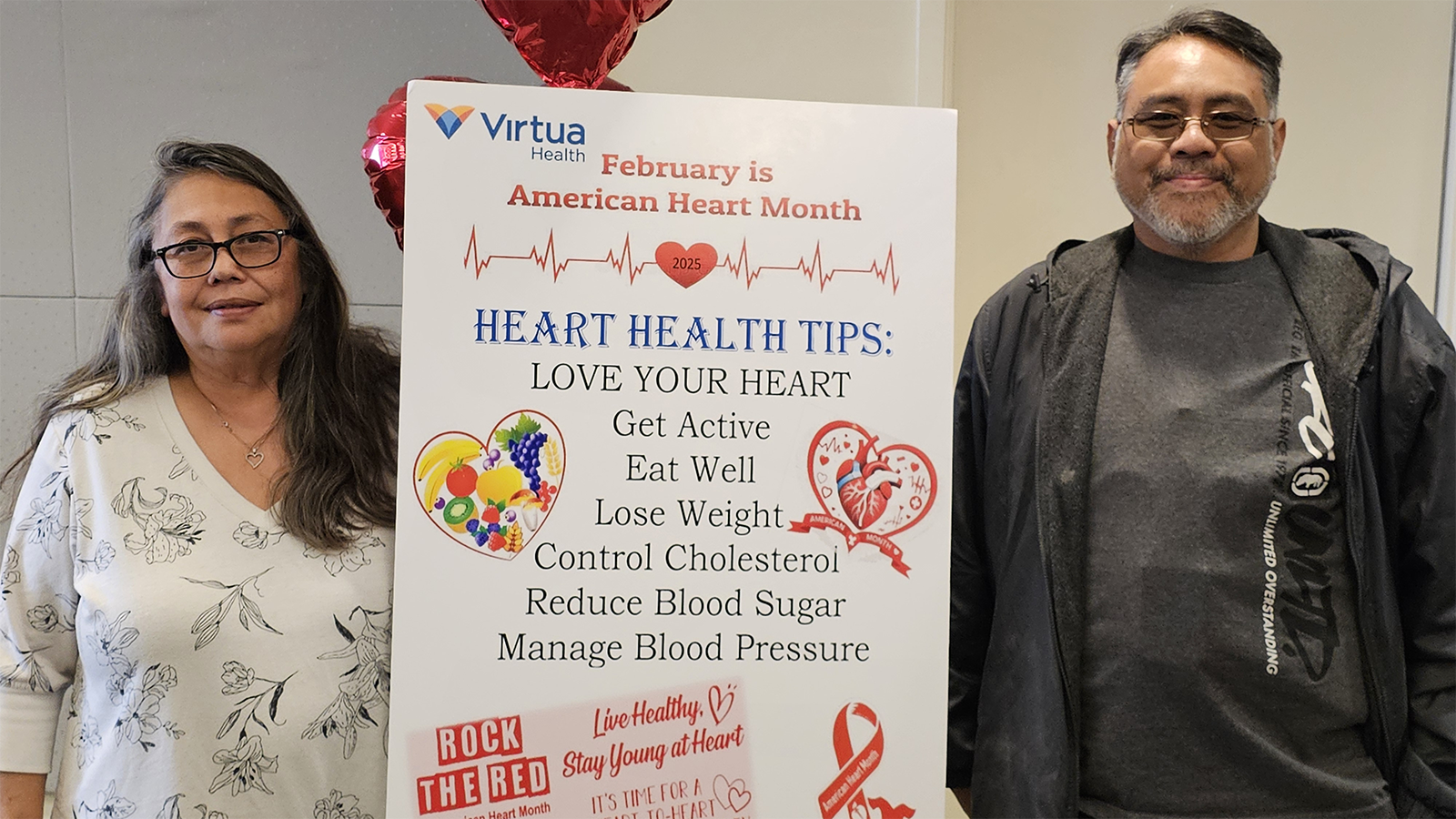Exercise Your Way to a Stronger Heart
Today, we know that exercise is safe for patients with heart failure and can help relieve symptoms. Robert Mohapatra, MD, Virtua Cardiologist, shares tips to be more active with heart failure.
By Robert Mohapatra, MD, MPH, FACC, Virtua Cardiology
Not long ago, if you were diagnosed with heart failure, you’d be told to stop strenuous activities and take it easy.
The prevailing wisdom was that too much strenuous activity would strain an already weakened heart. Today, we know that not only is exercise safe, it can help relieve heart failure symptoms.
Physical activity can help heart failure patients:
- Improve muscle strength and endurance
- Enhance abilities to perform daily activities, such as dressing, eating, and walking
- Reduce hospitalizations for symptom flare-ups
- Boost overall quality of life and sense of well-being
Steps for a winning workout
To be more active with heart failure:
- Talk with your healthcare provider before beginning an exercise program.
- Pick an activity you like. Walking and riding a stationary bike are two good choices to start.
- Be sure to warm up before starting and cool down afterward.
- Increase your level of activity slowly. This is especially important if you haven’t been exercising regularly.
- Aim for 20 to 30 minutes of daily exercise.
- Include flexibility (stretching, yoga, tai chi) and strength training (free weights, resistance bands) activities into your routine.
- Rest in between activities.
- Exercise when you have the most energy. For many people with heart failure, that is in the morning.
- Exercise with a friend or family member. It’s easier to keep going when you have a partner. Be sure to follow recommended social distancing guidelines.
- Avoid exercising outside if it’s colder than 40 degrees, warmer than 80 degrees, humid, or the air quality is poor.
- If you very tired, sick, or making medicine changes, skip exercise that day.
Know when to stop
As you exercise, it’s normal to feel a little short of breath, sweat, and have a faster heartbeat than normal. If you become dizzy, feel nauseous, or experience pain in your chest, shoulders, arms, neck or jaw, stop your activity and rest.
If your symptoms do not improve after you stop, call 911 right away.
Our team of heart failure experts focus on improving your quality of life and reducing your risk of being admitted to the hospital. With dedicated centers in Cherry Hill, Sewell, Willingboro, and Woodbury, we’re right in your neighborhood. Learn more about heart failure.
There's So Much More to Explore
Discover expert insights, inspiring stories, health tips, and more by exploring the content below!

How the Unique Stages of a Woman's Heart Affect Her Health

Complex Aortic Surgery Provides Lu’Shell Hope for the Future

HeartTalk Magazine

Are You Eating Too Much Salt? High-Sodium Foods to Watch For

4 Exercise Tips to Help You Reverse High Blood Pressure

Timely Heart Care During a Heart Attack Helps Joe Feed the Community

3 Reasons Why Now's the Time to Find Relief From Varicose Veins

Lifesaving Heart Care Creates a 'Bond That's Never Left Us'

How High Blood Pressure Affects Your Body

5 Interesting Facts About Your Heart

Get to the Bottom of Blood Pressure Numbers

CABG Surgery: What Women Should Know About Heart Health and Healing

When to Take Action for a Stronger Heart

Groundbreaking Renal Denervation Procedure Controls a Lifetime of High Blood Pressure

Patient Story: LVAD Mechanical Pump Strengthens Michael's Heart Function

Mitral Valve Surgery Keeps Yaneth Living the American Dream
Inside Look at Blood Vessels Aids PAD Treatment
Denise Davis: Pay Attention to Your Heart Health

Sweet Music: Trust, Teamwork Save Justin from Heart Attack

Complex Heart Surgery Nets James a Lifelong Friend

8 Key Steps to Better Blood Pressure Control

Signs You Should Get Treated For Vein Problems

One New Heart Valve Saves Two Lives in the Tritten Family

What You Need to Know About Heart Failure

6 Numbers Key to Keeping Your Heart Healthy

Five Mindfulness Tips That Can Help Heal Your Heart

Watchman Heart Device: a Technological Breakthrough for Blood Clot Prevention

Albert's Emergency Cardiac Surgery Is a 'Story of a Lifetime'

Love Your Heart: Essential Care Tips for Every Stage of Life

How Do I Measure My Blood Pressure at Home?

How Do I Improve My Cholesterol Levels?

3 Ways to Reduce Your Stroke Risk

Can Your Gut Health Affect Your Heart?
Advanced Heart Failure Therapies Get Bernadine Back to Full Speed

Keeping the Beat: Advanced Heart Surgery for Aortic Aneurysm

Heart-Healthy Summer Recipe: Hummus and Veggies

4 Delicious Heart-Healthy Recipes Perfect for Summer

Heart Healthy Summer Recipe: Dessert Parfait

Heart-Healthy Summer Recipe: Pear and Walnut Salad

Heart-Healthy Summer Recipe: Terrific Turkey Burgers
Atrial Fibrillation and Stroke: What's the Connection?
Heart Tests Your Doctor May Order
Managing Pregnancy for Mothers With Heart Conditions

Heart Healthy Recipe: Basil Pesto Pasta With Seared Vegetables

Heart Healthy Recipe Chocolate Avocado Chia Pudding
Keep Your Heart Rhythm in Check With Your Smartwatch
Mind Your Meds for Blood Pressure Risks
Magic Pill for Heart Health? Cut 300 Calories a Day
3 Smart Ways to Boost Your Heart Health
3 Best Exercises For Heart Health

Get Your Heart Pumping With These 25 Workout Songs
Your Chest Pain: Heartburn, Heart Attack, or Something Else?
3 Heart Healthy Recipes to Win Valentines Day
How Work and Home Stress Can Affect You
Why Improving Your Health Is Going To The Dogs And Cats
Why Younger Women Need Start NOW To Safeguard Their Hearts From Heart Attacks
Can You Die of a Broken Heart?
Mitral Valve Surgery Opens Doors for Improved Quality of Life
6 Healthy Habits to Start in Your 20s for Better Lifelong Health
Do You Have a Fatty Heart?
Get Pumped! Assist Devices Can Improve Heart Failure Symptoms
A Cardiologists Advice on Heart-saving Emergency Cardiac Care
Virtua Doctor’s Experience Is a Warning for All About COVID-19 and Strokes
You May Feel Fine, but Gregory Says "Don't Skip Your Medical Care"
In Sickness and in Health: Couples Often Share Heart Disease Risk
"Reduce Your Heart Disease Risk With a Plant-based Diet"
Hybrid Robotic Heart Surgery and Valve Replacement Restores Quality of Life
Can Marijuana Hurt Your Heart Health?
6 Tips for Restoring Your Heart Rhythm
Eat Smart for Your Heart
Cardiac Rehab: Strengthening Your Heart After Leaving the Hospital
Your Heart Needs A Good Nights Sleep
Are You at Risk for AAA—the Silent Killer?
The Cardio Oncology Team Protects Your Heart During Cancer Treatment
Get Relief From Painful Varicose Veins This Summer
Exercise Your Way to a Stronger Heart
Fish Oil: A Good Catch or a Scam?
My Heart Seems to Skip a Beat - Should I Be Worried?
Menu Planning? Try These 5 Heart-smart Substitutions

5 Health Risks Tied to Weight

